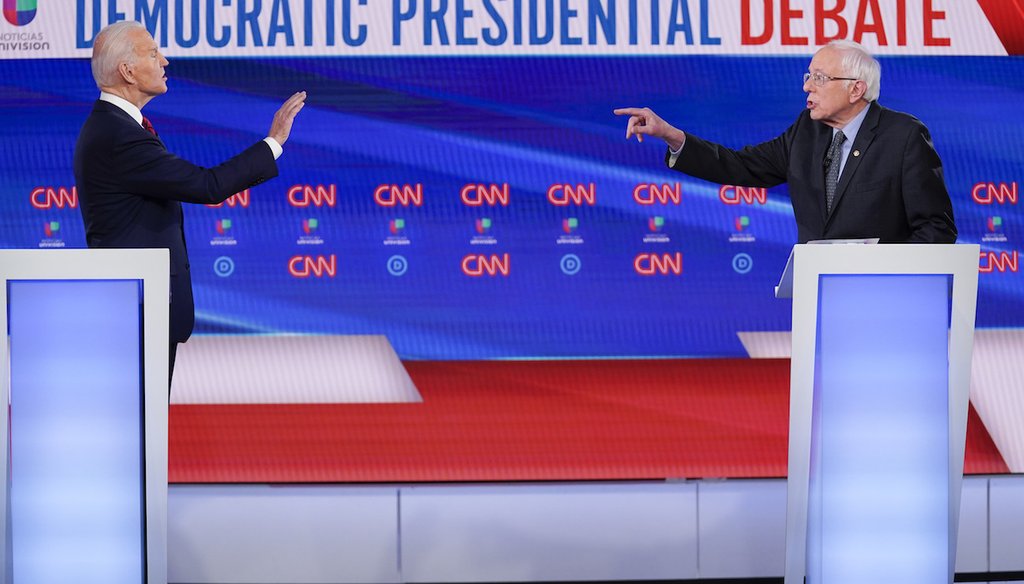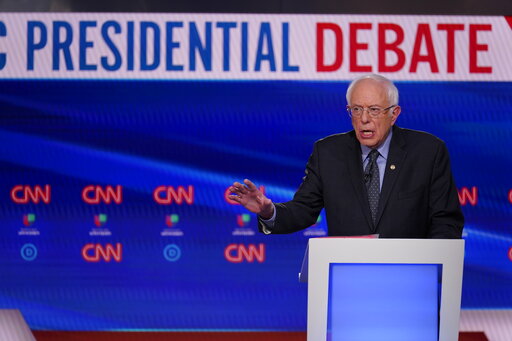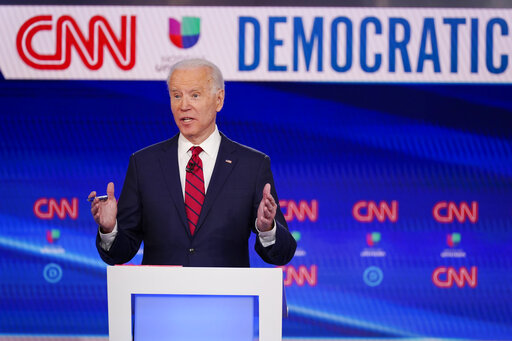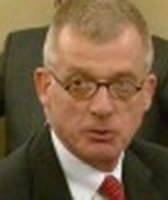Stand up for the facts!
Our only agenda is to publish the truth so you can be an informed participant in democracy.
We need your help.
I would like to contribute

Former Vice President Joe Biden, left, and Sen. Bernie Sanders, I-Vt., right, participate in a Democratic presidential primary debate at CNN Studios in Washington, Sunday, March 15, 2020. (AP Photo/Evan Vucci)
Joe Biden and Bernie Sanders debated alone for the first (and maybe last) time Sunday on a closed Washington television set, jointly criticizing President Donald Trump’s handling of the growing coronavirus crisis while attacking each other over their past votes and statements.
There was a lot for fact-checkers to sort out, including a back-and-forth that centered on us (yes, PolitiFact) and attacks and counter-attacks over the candidates’ statements about Social Security.
- The candidates claims about coronavirus
- Does Bernie Sanders have nine super PACs?
- Biden, Sanders spar over Social Security. Biden cites PolitiFact.
- Biden said Sanders voted against the auto bailout. Half True.
- Pro-abortion rights group has dinged Biden in the past.
- Did Joe Biden campaign for a $15 minimum wage?
Bernie Sanders: "We have a lack of medical personnel. And I worry very much that if there is a peak, whether we have the capability of dealing with hundreds of thousands of people who may be in hospitals."
Sanders is clearly not the only one to worry — and the facts are on his side. Public health experts are sounding the alarm that if the virus infects people quickly, and enough show symptoms, the system will be overwhelmed.
In a March 12 op-ed in the New York Times, health policy experts pointed out that the nation has insufficient hospital beds, even if only 5% of the country contracts the illness. The authors — Ezekiel J. Emanuel at the University of Pennsylvania, James Phillips of George Washington University Hospital and Govind Persad at the University of Denver — specifically pointed to worries about "shortages of medical staff and equipment."
Those worries are widespread. In New York State, Gov. Andrew Cuomo has suggested temporarily halting elective surgeries and re-certifying retired doctors and nurses. And if the virus afflicts health care workers, too, that would further constrain the system’s capacity.
Put simply, "we do not have anywhere near capacity to take care of tens of thousands of people with [COVID-19] who might need hospitalization," Dr. Ashish Jha, a health policy researcher at Harvard University, recently told WBUR, the local NPR station.
A February report put out by researchers at Johns Hopkins University tallied a total of 46,500 intensive care unit beds across the entire United States. If the virus spreads at a moderate pace, the researchers estimated, 200,000 Americans would ultimately need ICU beds. A separate Hopkins report found only 160,000 ventilators in the country — enough for a moderate outbreak, but not enough if it spirals into something worse.
They wouldn’t necessarily need those beds all at once, of course. But it’s still a lot more sick people than beds — especially when you consider that many ICU beds are already in use for people with other medical conditions, such as the flu.
— Shefali Luthra
Associated Press
Joe Biden: "They (the military) did it in the Ebola crisis. They have done it. They have the capacity to build 500-bed hospitals and tents that are completely safe and secure and provide the help to get it done to this overflow."
Biden is right that the military added to hospital capacity during previous epidemics, but it’s not clear they were as large or as effective as he said they were.
We asked the Biden campaign for details but didn’t hear back. But there are a couple of potential past examples.
First, the Ebola crisis. While Biden was vice president, the U.S. military helped increase capacity for treatment in Liberia. According to a 2014 White House press release, American efforts to curb the spread of the disease included "build(ing) additional Ebola Treatment Units in affected areas," "establish(ing) a site to train up to 500 health care providers per week" and sending a "field-deployable hospital to Liberia."
But it’s also important to note that the efficacy was limited, especially regarding the treatment units. An April 2015 New York Times report found that of the 11 Ebola treatment units the military built, nine had never treated a single patient with the disease. In total, they had treated only 28 patients.
It’s unclear, though, whether the Ebola units are the same as these 500-person tents Biden was referencing. We checked his campaign’s coronavirus plan. It does allude to deploying another existing resource: "multi-hundred-bed temporary hospitals" known as Federal Medical Stations.
These stations have been used in previous public health crises, including countless hurricanes over the past 15 years. They are, according to the Centers for Disease Control and Prevention, an important resource in building the health system’s holding capacity, especially in times of such difficulty.
Biden’s numbers are off, though. These temporary medical facilities can house between 50 and 250 patients and are treated as a stopgap when hospitals overflow. They can provide low-acuity care and other support. But that’s far short of 500-bed hospital equivalents.
— Shefali Luthra
Bernie Sanders: "You have been on the floor of the Senate time and time again talking about the need to cut Social Security, Medicare and veterans' programs."
This leaves out context and ignores Biden’s subsequent positions in opposition to such cuts.
Sanders emphasizes old statements by Biden, some decades ago, that show a willingness to slow spending in an effort to reduce the federal deficit. (Sanders calls this a "cut.")
During the 1980s and 1990s, Biden spoke in favor of freezes to Social Security as part of an effort to reign in all spending to reduce the deficit. For instance, Biden said in 1984 that "the only way that Congress will ever be able to come to grips with deficits is by dealing with all federal programs as a package."
Sanders has also used audio of Biden saying in 1995, "When I argued that we should freeze federal spending, I meant Social Security as well. I meant Medicare and Medicaid. I meant veteran’s benefits. I meant every single solitary thing in the government."
However, Biden’s focus has changed to protecting Social Security from cuts since he became vice president in 2009.
Biden’s message in the current campaign is that he is firmly against cuts to the program. Sanders has also called for expanding Social Security.
Biden called out Sanders during the debate for an ad "saying I'm opposed to Social Security, that PolitiFact says is a flat lie, and that The Washington Post said is a flat lie." PolitiFact rated the ad about Biden’s record over 40 years Mostly False.
— Louis Jacobson
Bernie Sanders: "I have been consistent (on the Hyde Amendment). I have always believed in that."
This is Half True. Sanders has a point that he has consistently voted in favor of abortion rights when it comes to stand-alone votes on the Hyde Amendment. The amendment is a long-standing measure that bars federal dollars from being used to pay for most abortions.
But when broad spending packages that include a version of the amendment have come up, Sanders has voted to send them through numerous times. The amendment’s language is often plugged into the annual bills that fund the Department of Health and Human Services.
CNN’s Dana Bash, a moderator of the March 15 debate, asked Sanders about his voting for broad spending bills in June. He said that sometimes, "in a large bill, you have to vote for things you don’t like. But I think my record as being literally 100% pro-choice is absolutely correct."
— Bill McCarthy
Joe Biden: "Are you getting rid of the nine super PACs you have?"
Bernie Sanders: "Nine super PACs? I don’t have any super PACs."
Both Biden and Sanders are exaggerating here.
The Biden camp pointed to a coalition of nine groups that have been widely reported to be supporting Sanders, including the Democratic Socialists of America, the Sunrise Movement, Our Revolution, the Center Popular Democracy Action, Make the Road Action, People's Action, Student Action, Progressive Democrats of America, and Dream Defenders.
Officially, only three of the nine groups in the pro-Sanders coalition have a super PAC: Dream Defenders, People’s Action, and Make the Road.
Super PACs proliferated after the Supreme Court’s ruling in the Citizens United case. They can raise and spend unlimited amounts, as long as they don't directly coordinate with candidates or party committees.
The other groups supporting Sanders are organized in different ways, such as 501(c)4 groups that are regulated by the Internal Revenue Service.
Many of these other groups are unofficially called "dark money" by critics, since there are gaps in transparency about where the money is coming from. But they are not technically super PACs.
Biden, for his part, benefits from the super PAC Unite the Country. Neither candidate, under law, can coordinate with these outside groups.
— Louis Jacobson
Associated Press
Joe Biden: "I’ve gotten 100% rating from NARAL. ... I know my record of late from NARAL has been 100%. I don’t know whether it was 25 years ago."
Biden did earn 100% ratings from NARAL, the abortion-rights group, four times during his final years in Congress, but his framing in the debate left out several ratings that were much lower.
Biden received a 100% rating from NARAL Pro-Choice America in 2001, 2004, 2005, and 2006. That is based on how closely his votes aligned with the group’s priorities. Meanwhile, Biden was just below that in 2000 with a 90% rating, and had a 75% rating in 2007.
In other years, however, Biden’s ratings from NARAL were significantly lower.
For instance, 17 years ago, in 2003, he earned a 36% rating. In 1999, his rating was 46%. In 1997, his rating was 34%. And in 1996, Biden’s rating was 43%.
It was only in 2019 that Biden backed off his longstanding support for the Hyde Amendment, which bans the use of federal funds to pay for abortions. In 1994, for instance, Biden wrote to constituents that he had "on no fewer than 50 occasions" voted against federal funding for abortions. "Those of us who are opposed to abortions should not be compelled to pay for them," he wrote, according to NBC News.
Sanders, for his part, has earned a 100% rating from the group consistently, going back to 1996.
— Louis Jacobson
Bernie Sanders: "The Fed gave trillions and trillions of dollars in zero-interest loans to every financial institution in this country and central banks all over the world."
This is not fully accurate. Sanders’ claim oversimplifies a complex government response to the financial crisis of 2008.
By our calculations, the total spent to stem the crisis ranged from roughly $1.4 trillion to about $3.1 trillion, depending on whether you count direct government bailouts authorized by Congress and the Federal Reserve’s purchase of mortgage securities in addition to the Fed’s recession lending programs.
But while the biggest Wall Street players benefited greatly, banks and other businesses across the country also got some help. Finally, the interest rates for most of the loans — and there were different types — were very low. But they were not zero, according to Fed data.
— Bill McCarthy
Joe Biden: "I went out and campaigned for (raising the minimum wage) … $15 an hour in New York City. Go talk to the governor."
Biden is right about his efforts in New York, despite Sanders’ suggestion that Biden has only "come around" to supporting a $15 hourly minimum wage "since the campaign."
In 2015, Biden as vice president campaigned with New York Gov. Andrew Cuomo to boost the state of New York’s minimum wage to $15 per hour, according to the state’s government website. Cuomo eventually signed legislation to gradually increase the hourly minimum wage to $15 for all New Yorkers.
The effort was widely covered by local and national news organizations at the time. During the event with Cuomo, Biden spoke for nearly 30 minutes and called "stagnant wages" the biggest issue facing the economy.
"The single most rapid, important thing that we can do to deal with wage inequity and start this virtuous cycle is what the governor did today, raising the minimum wage," Biden said. "The higher it’s raised, the more impact it has immediately on the lives of individuals."
— Bill McCarthy
Joe Biden: "Part of that was bailing out the automobile industry — saving thousands of jobs, tens of thousands of jobs over time. (Sanders) voted against that as well."
This claim is Half True.
Sanders did vote against a set of funds that financed most of the auto bailout — though the funds’ primary purpose was bailing out Wall Street firms, which Sanders strongly opposed.
But Biden left listeners with the impression that Sanders’ opposed bailing out the auto industry. Sanders voted in favor of providing auto companies with $14 billion, which was separate from the Wall Street bailout funds he opposed. That standalone measure failed.
— Amy Sherman
Joe Biden: "I wrote the first climate change bill that was in the Congress, PolitiFact said was a game changer."
Yes, and no. We rated True his claim in May 2019 when he said he was "one of the first guys to introduce a climate change bill."
But we did not describe his bill as a "game changer." Experts gave him credit for being an early supporter of climate change action, but also warned against inflating his bill’s impact.
— Miriam Valverde
Our Sources
Sources for this story are linked in the text.



































